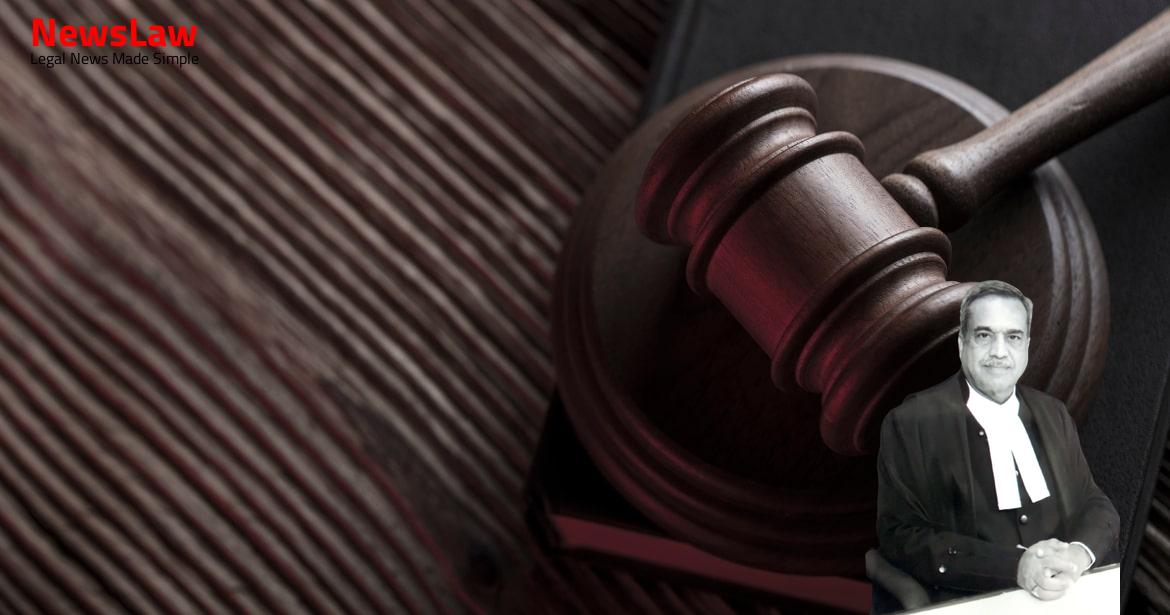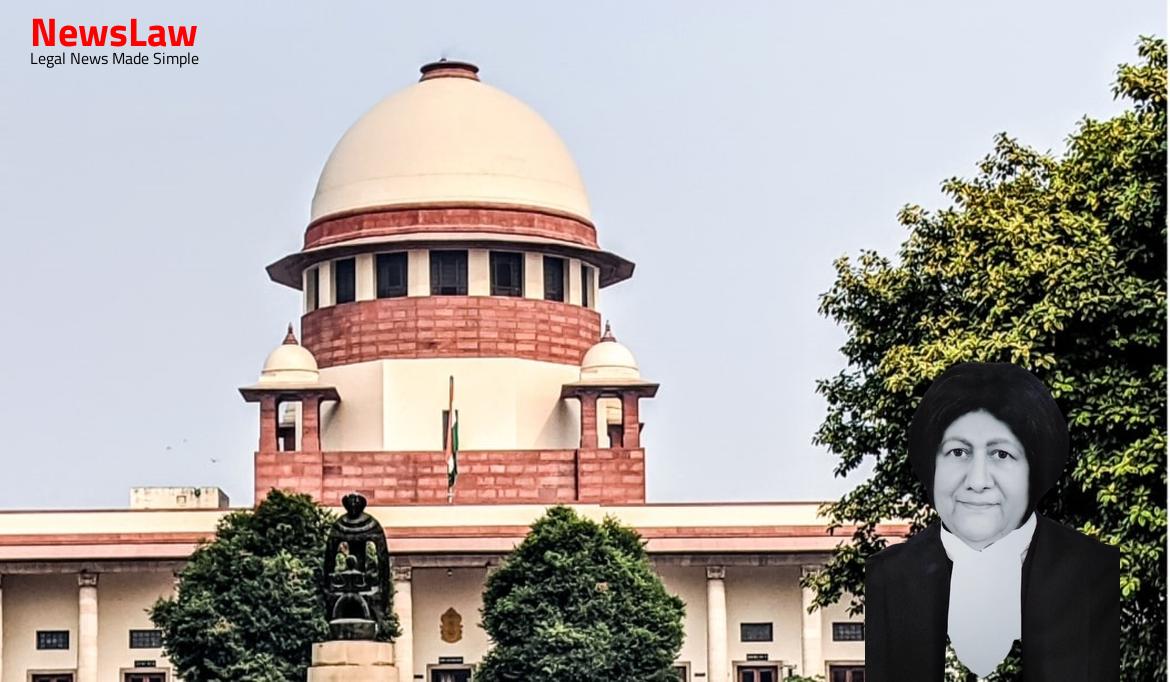Explore a detailed examination of how the courts handled jurisdictional complexities and fraud allegations in a recent banking case. The focus is on the court’s legal analysis and application of relevant laws to ensure the fair and just resolution of the dispute.
Facts
- The Guarantor filed a writ petition before the High Court of Madras denying his guarantee and creation of EMT.
- O.A. No 489/2001 was transferred to DRT, Coimbatore and decreed in favour of the appellant-bank for Rs.57,35,770/- with 18% interest per annum.
- Recovery Officer issued a Demand Notice directing payment of Rs.1,55,75,443/- to the principal borrower, partners, and Guarantor.
- Properties of the partnership firm were auctioned in 2007 by the bank to recover Rs.38 lacs.
- Dispute over land belonging to the Guarantor, secured by mortgage for the loan.
- Criminal proceedings and FIR registered in relation to the case, with final report filed under various sections of IPC against partners and an officer of the bank.
- Criminal proceedings against the bank officer were quashed by the High Court in 2011.
- The appellant, a bank, sanctioned a term loan to a partnership firm in 1995.
- Subsequently, a Guarantor filed for setting aside an ex-parte decree in 2008, which was dismissed by the DRT in 2009.
- The respondents filed suits in 2010 and 2011 challenging the DRT decree, naming the bank as a defendant.
- The bank filed applications to reject the plaints citing lack of jurisdiction under the RDDBFI Act.
- The applications were opposed, alleging fraud by the bank and others.
- The trial court rejected the applications, which were then challenged in the High Court by the bank.
- The High Court upheld the trial court’s decision based on the complexity of the issues raised.
Also Read: Court’s Analysis on Interim Order for Appointing Contractual Employees
Arguments
- The appellant-bank argues that they are not party to the criminal proceedings against the partners of the partnership firm
- The criminal proceedings were related to the partnership deed and not the guarantee deed executed by the guarantor
- The appellant-bank claims that the suits filed by the original plaintiffs are frivolous and an abuse of the legal process
- The appellant-bank cites various court decisions to support their argument for rejecting the plaints under Order 7 Rule 11(d) of the CPC
- The original plaintiffs challenge the decree passed by the DRT, Coimbatore and argue that they are bona fide purchasers of the properties
- The Magistrate found that there was a criminal conspiracy involving forged documents to obtain a loan from the bank
- Both the trial Court and the High Court refused to reject the plaints under Order 7 Rule 11(d) of the CPC
- The appellant-bank refers to a decision of the Madras High Court where a suit alleging fraud was deemed not maintainable when challenging an order by the Recovery Officer
- The appellant-bank argues that the specific allegations of fraud in this case should only be handled by the civil court, hence the rejection of plaints was not warranted
- The appellant contends that proper consideration of the RDDBFI Act provisions was lacking in the decisions of both the High Court and trial Court
- The plaintiffs cannot rely on the criminal proceedings or the word ‘fraud’ mentioned in the plaints.
- Allegations of fraud in the plaints are illusory.
- The suits are deemed vexatious with mala fide intentions.
- The situation presents a suitable case for exercising powers under Order 7 Rule 11(d) of the CPC.
- Guarantor Shri M.C. Kallikutty, also a co-obligant, is jointly and severally liable for loan repayment.
- The term loan is secured by the partners of the partnership firm through mortgaging firm lands and by Guarantor Shri M.C. Kallikutty through mortgaging his own lands.
- The guarantee deed by Shri M.C. Kallikutty was not presented before the learned Magistrate.
Also Read: The Supremacy of Pharmacy Act in Regulating Pharmacy Education
Analysis
- The suits filed by the original plaintiffs challenging the decree passed by the DRT were found to be vexatious, frivolous, and an abuse of process of law.
- The court found that the allegations of fraud in the suits were illusory and made with a mala fide intention to evade the judgment and decree passed by the DRT.
- The suits were filed after significant delays from the date of mortgage and decree by the DRT, raising questions about the timing and intentions of the original plaintiffs.
- The High Court’s intervention in the case through a petition under Article 227 was deemed inappropriate as there were alternative legal remedies available.
- The court highlighted that the power under Order 7 Rule 11 of the CPC can be exercised at any stage of the suit and pointed out that the plaints should have been rejected based on the facts and circumstances.
- The need for specific instances and evidence of fraud to be pleaded in the plaint was emphasized, and the court observed that the allegations made were vague and lacked substance.
- The importance of exhausting alternate legal remedies before resorting to petitions under constitutional provisions like Articles 226 and 227 was underscored.
- The court noted discrepancies in the claims made by the original plaintiffs regarding the purchase of the suit property and the execution of sale deeds.
- Overall, the analysis revealed that the suits were meritless, lacked a clear right to sue, and should have been rejected by the courts under Order 7 Rule 11 of the CPC.
- The Division Bench of the Madras High Court rejected the plaint challenging the order of the DRT using Order 7 Rule 11(d) of the CPC.
- The court can unravel illusions or repetitions in the plaint during Order 7 Rule 11(a) proceedings.
- Proceedings with illusory causes of action must be stopped early on.
- The real cause of action must be present in the plaint to avoid Order 7 Rule 11 dismissal.
- Clever drafting creating a false cause of action should be detected and dismissed promptly.
- The RDDBFI Act provides a special procedure for debt recovery by banks and financial institutions.
- Remedies under the RDDBFI Act must be exhausted before approaching the High Court under Article 227.
- A suit cannot circumvent legal bars like limitation through clever drafting to avoid mentioning those circumstances.
- The plaints are vexatious, frivolous, and meritless, constituting an abuse of process of law and court.
- The plaints lack specific pleadings and averments on limitation, rendering them unable to escape the law of limitation.
- Both courts below erred in not rejecting the plaints using the powers under Order 7 Rule 11(d) of the CPC.
- The appeals succeed based on the grounds of the issues with the plaints and the lack of jurisdiction exercised by the lower courts.
- The plaints were liable to be rejected under Order 7 Rule 11(d) of the CPC.
Also Read: Judicial Analysis: Death Penalty Conversion in Landmark Case
Decision
- The instant appeals are allowed.
- The impugned common judgment and order passed by the High Court are quashed and set aside.
- Orders passed by the trial court rejecting applications of the appellant-bank under Order 7 Rule 11(d) are quashed.
- Plaints filed by the original plaintiffs in O.S. No 1269/2010 and O.S. No 233/2011 are rejected.
- No costs to be incurred.
Case Title: CANARA BANK Vs. P SELLATHAL (DEAD) THR LRS (2020 INSC 234)
Case Number: C.A. No.-001863-001864 / 2020



